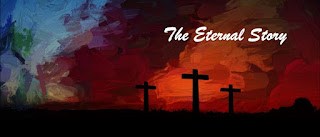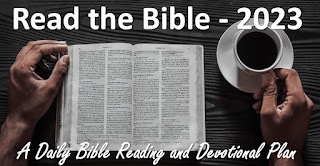Dangerous Faith - February 18 Readings: Exodus 14, The Exodus
The Story of the Bible from Creation to the Cross to Eternal Glory
In 72 daily readings, we will examine the overall story of the Bible from Genesis to Revelation, seeking to get the big picture of God's work through Jesus Christ in this sinful world.
Today's Reading: Exodus 14
Through the Bible Reading: Leviticus 14-15, Matthew 28, Psalm 25:6–12, Proverbs 6:12-15
If you wish to read through the Bible in a year, follow these readings.
Context
It is the most significant event of the Old Testament, the saving event which brought Israel out of Egypt, upon which all of God's commands to Israel are later based. "I am the God who brought you up out of Egypt, be holy..." "I am the God who brought you out of Egypt, worship me alone...." Praise, Obedience. Sacrifice. Worship. Devotion. Everything God demanded of Israel was rooted in the fact that he parted the Sea and brought them through on dry ground.
In the New Testament, it is God's saving act through Christ on the cross which parted the sea of sin and rescued us. As all of God's commands to Israel are rooted in the Exodus, all of God's work in us is rooted in the cross. We love because God loved us and demonstrated it at the cross. We worship at the foot of the cross and praise the Lamb who was slain. We walk in obedience to the Christ who gave himself for us at Calvary.
This was God's greatest Old Testament miracle because it was the most significant, the saving act, the one that broke the slavery of Israel and changed their existence. It took them from slavery to freedom and destroyed the armies of Pharaoh.
Devotional: Dangerous Faith
Israel was in quite a fix.
On one side was the Red Sea, deep and wide. There was no way they could go around it, build a bridge over it, or swim through it. The sea blocked their way completely so there was no way the people could go forward.
Behind them, things were even worse as the armies of Egypt bore down on them with ferocity, determined to avenge themselves for the death of their firstborn sons. It was an angry band of soldiers who rode against Israel, a band of former slaves who were unarmed, untrained, and defenseless. Yes, it was quite a fix. The fledgling nation of Israel was doomed before it even got started. Sudden death was coming on them from behind and their way was blocked before them.
So, what did they do? They grumbled. They complained. They blamed Moses and they whined about their troubles. For some reason, a lot of God's people think that whining and complaining are Fruits of God's Spirit that are essential for life in God's kingdom. But they have never accomplished anything.
Instead of reacting to the whining and complaining of the people, God did something strange. He gave them a command, in verse 15.
Of course, God had a plan. He told Moses to take his staff that represented the power of God and to stretch it out so that the power of God would be released and the sea would be parted. God already had a plan to part the sea but the people had to move forward before God would part the waters. The same thing would happen years later at the Jordan when God would tell the men carrying the Ark to step into the Jordan at flood stage and only then would God stop the river.
God calls us to obedient faith as a condition of the release of his power. We want God to display his power, open all the doors, knock down all the obstacles, and then we can walk through on dry ground. God tells us to move forward with only the promise of his power and then watch him work. They were to stand firm in their obedience and trust, move forward in faith, and then they would see the salvation of God.
At the root of all of God's great works is one thing we are almost never willing to do - risk everything in obedience to God. We want to play it safe. We like guarantees and safety. But God calls us to give it all up for him, to step into the water knowing that if he doesn't work we will be in deep (literally) trouble.
Could that be why we see so little of the power of God?
On one side was the Red Sea, deep and wide. There was no way they could go around it, build a bridge over it, or swim through it. The sea blocked their way completely so there was no way the people could go forward.
Behind them, things were even worse as the armies of Egypt bore down on them with ferocity, determined to avenge themselves for the death of their firstborn sons. It was an angry band of soldiers who rode against Israel, a band of former slaves who were unarmed, untrained, and defenseless. Yes, it was quite a fix. The fledgling nation of Israel was doomed before it even got started. Sudden death was coming on them from behind and their way was blocked before them.
So, what did they do? They grumbled. They complained. They blamed Moses and they whined about their troubles. For some reason, a lot of God's people think that whining and complaining are Fruits of God's Spirit that are essential for life in God's kingdom. But they have never accomplished anything.
Instead of reacting to the whining and complaining of the people, God did something strange. He gave them a command, in verse 15.
Why do you cry to me? Tell the people of Israel to go forward.Uh...um...excuse me, Lord. But there's a small problem - there's this large sea in front of us. But that was God's command. Go forward. In spite of the problems and obstacles. Disregarding the obstacles. Go forward in the power of the God who saves.
Of course, God had a plan. He told Moses to take his staff that represented the power of God and to stretch it out so that the power of God would be released and the sea would be parted. God already had a plan to part the sea but the people had to move forward before God would part the waters. The same thing would happen years later at the Jordan when God would tell the men carrying the Ark to step into the Jordan at flood stage and only then would God stop the river.
God calls us to obedient faith as a condition of the release of his power. We want God to display his power, open all the doors, knock down all the obstacles, and then we can walk through on dry ground. God tells us to move forward with only the promise of his power and then watch him work. They were to stand firm in their obedience and trust, move forward in faith, and then they would see the salvation of God.
At the root of all of God's great works is one thing we are almost never willing to do - risk everything in obedience to God. We want to play it safe. We like guarantees and safety. But God calls us to give it all up for him, to step into the water knowing that if he doesn't work we will be in deep (literally) trouble.
Could that be why we see so little of the power of God?
Father, Fill me with your grace, power, and strength. Help me to walk in faithful obedience, to go foward according to your call.
Think and Pray:
Do you play it safe, or do you follow Christ wherever he leads?
When have you done something in obedience to God that was so risky that if God did not act in power, you would utterly fail?
When have you done something in obedience to God that was so risky that if God did not act in power, you would utterly fail?



Comments
Post a Comment